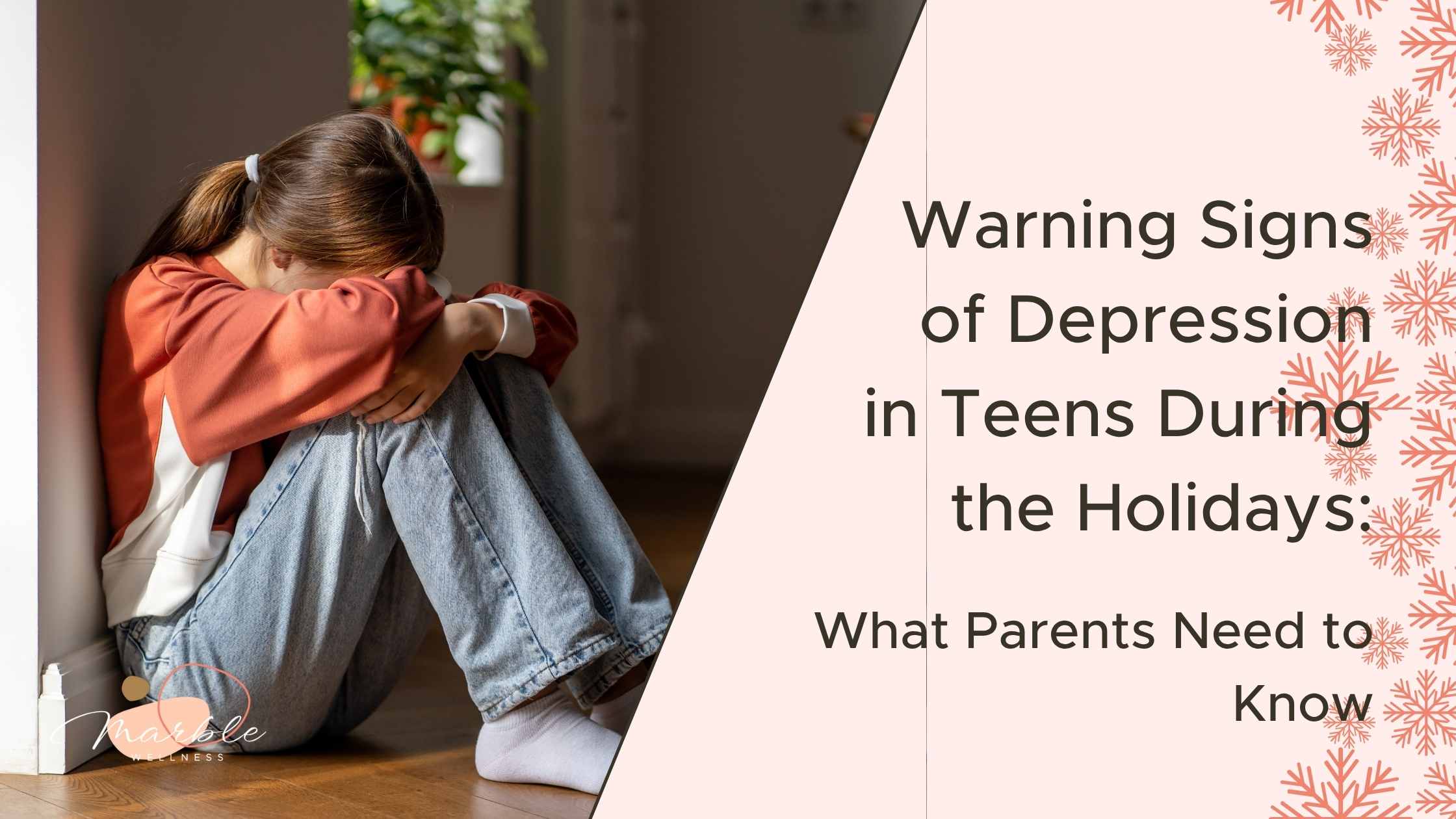The holidays are often painted as a season of joy, connection, and celebration. But for many teens, this time of year can amplify feelings of isolation, sadness, and stress. Between disrupted routines, social pressures, and complex family dynamics, holiday mental health challenges can quietly take root, and depression may go unnoticed.
As a parent, knowing what to look for and how to respond can make all the difference. Let’s explore the warning signs of depression in teens during the holidays and how you can support your child with empathy and confidence.
Why the Holidays Can Be Hard for Teens
While adults may feel nostalgic or energized by holiday traditions, teens often experience the season differently. Here’s why:
- Loss of structure: School provides routine, social interaction, and purpose. Winter break can feel aimless or isolating.
- Family tension: Gatherings may stir unresolved conflicts or emotional discomfort, especially in blended or strained families.
- Social comparison: Teens may compare their experiences to idealized versions on social media or among peers.
- Grief and loss: Holidays can intensify feelings of missing loved ones or past traditions.
- Academic pressure: The looming return to school, exams, or college decisions can create background anxiety.
These stressors can contribute to low mood, irritability, and withdrawal, sometimes masking deeper signs of depression.
Teen Depression Warning Signs to Watch For
Teen depression doesn’t always look like sadness. It can show up in subtle or unexpected ways. Here are key signs to monitor:
1. Changes in Sleep or Appetite
- Sleeping too much or too little
- Skipping meals or overeating
- Complaints of fatigue despite rest
2. Withdrawal from Friends and Activities
- Avoiding social events or isolating in their room
- Losing interest in hobbies they once enjoyed
3. Persistent Irritability or Mood Swings
- Snapping at family members
- Seeming “on edge” or emotionally flat
4. Negative Self-Talk or Hopelessness
- Expressing feelings of worthlessness
- Saying things like “What’s the point?” or “No one cares.”
5. Difficulty Concentrating or Making Decisions
- Struggling with simple tasks
- Appearing distracted or forgetful
6. Physical Complaints Without Clear Cause
- Headaches, stomachaches, or body pain
- Frequent visits to the nurse or requests to stay home
7. Risk-Taking or Self-Harm Behaviors
- Substance use, reckless driving, or self-injury
- Talking about death or disappearing
Supporting Holiday Mental Health in Teens
You don’t need to be a therapist to make a meaningful impact. Here’s how to foster emotional safety and resilience:
Create Space for Honest Conversations
Let your teen know you’re available without pressure. Use gentle check-ins like: “You’ve seemed a little off lately. Want to talk?” or “The holidays can be tough. How are you feeling about everything?”
Avoid judgment, comparisons to your own life, or quick fixes. Just listen and validate.
Respect Their Need for Autonomy
Teens may need alone time or may opt out of certain gatherings. That’s okay. Offer choices and validate their boundaries.
Balance Activity with Rest
Encourage movement, fresh air, and creative outlets but also honor downtime. Over-scheduling can backfire.
Limit Social Media Exposure
Help your teen notice how online content affects their mood. Suggest screen-free zones or shared activities as alternatives.
Model Emotional Regulation
Your own stress management sets the tone. Narrate your coping strategies: “I’m feeling overwhelmed, so I’m taking a walk to clear my head.”
When to Seek Professional Help for Your Teenager
If your teen’s symptoms interfere with daily life, don’t wait. Reach out to a pediatrician, school counselor, or mental health provider. Early intervention can prevent deeper struggles and empower your teen with tools for healing. You might say, “I’ve noticed you’re really down lately. I think talking to someone could help.” or “We care about you so much, and we want to make sure you feel supported.”
What Not to Say to Your Teen Who Might Be Depressed
Avoid minimizing or dismissing their experience. Phrases like: “You have nothing to be sad about”, “It’s just a phase”, or “Other people have it worse” can shut down communication and increase shame. Instead, validate their feelings and offer hope.
Start Therapy for Teens in the St. Louis Area
Teen depression during the holidays is more common than many parents realize. By staying attuned to warning signs and creating a supportive environment, you help your child feel seen, heard, and valued. Holiday mental health isn’t about perfect celebrations; it’s about emotional connection, safety, and compassion. Your presence, patience, and willingness to engage can be the greatest gift of all.
If you live in the St. Louis metro area and are ready to improve your mental health, our expert St. Louis therapists are here to help. Not only do we have a team of therapists in Ballwin, MO, but we have also recently expanded to serve the Lake St. Louis and Wentzville area! Reach out to our Client Care Coordinator today to discuss your therapy options, both in-person and via online therapy in Missouri.
Contact Us!
Learn About Our Group Offerings

Additional Counseling Services at Marble Wellness in St. Louis, MO
Marble Wellness Counseling services are designed to help set you on a path of living a more fulfilled, calm, and happy life. Our St. Louis area therapists have a variety of training backgrounds and areas of expertise. We have child and play therapists, therapists for teens, EMDR therapists, men’s mental health experts, couples therapists, and more! We specialize in anxiety, depression, grief, chronic illness, trauma & PTSD, life transitions, and maternal overwhelm. Our practice also specifically helps new moms with various postpartum concerns, moms in the thick of parenting, and moms with teens. We can also chat from wherever you are in the state with online therapy in Missouri. No matter where you are in your journey, we are here to help you thrive!



